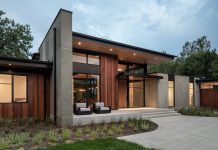If you’re needing a break from holiday hoopla, the Minnesota Society of Architectural Historians (MNSAH) has a lovely free program for architecture and design buffs on Thursday night. It’s called Works in Progress 2018 and focuses on three topics close to any architecture aficionado’s heart: the state’s Carnegie Libraries; the late, great, river-side restaurant Fuji-Ya; and California’s Case Study Houses. Presented by local scholars, preservationists, and curators, Works in Progress takes place December 6, from 7-9:30 a.m., at the Saarinen masterwork Christ Church Lutheran in Minneapolis. A reception follows the presentations.

During “Fuji-Ya, second to none: Reconnecting Minneapolis and the Mississippi River,” architectural historians Kimmy Tanaka (who is also a historic site interpreter at the Mill City Museum) and Jonathan Moore will discuss how entrepreneur and restauranteur Reiko Umetani Weston opened the first Japanese restaurant in Minnesota along the Mississippi riverfront in Minneapolis.
Weston started the business in a two-car garage in 1959, then in 1968 transformed an old flour mill along the Minneapolis riverfront into a traditional Japanese restaurant. Her pioneering spirit is now reflected in the adaptive reuse of former industrial buildings throughout the Mill District. In 1990, the city bought out the historic restaurant building to make room for a parkway and Fuji-Ya moved to a new spot near Uptown.

Minnesota’s historic Carnegie libraries are also on the evening’s program. Historian Greg Gaut will describe the 66 libraries built in Minnesota with Carnegie funding between 1900 and 1918. He’ll also talk about the impact of the libraries on their communities, and describe how local architects have expanded or adapted many of these structures to increase their functionality in the digital age.
Our own Ralph Rapson was one of the mid-century modern architects who participated in the lauded program known as Case Study Houses: 1945-1966, as did did Charles Eames, Eero Saarinen, and Richard Neutra. California architect Gordon Olschlager (and graduate of North Dakota State University) will discuss efforts to preserve these gorgeous cultural resources in the wake of intense economic pressures.

















